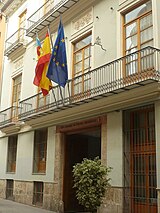Royal Academy of Valencian Culture
Real Acadèmia de Cultura Valenciana | |
 Headquarters of the RACV | |
| Abbreviation | RACV |
|---|---|
| Formation | 1915 |
| Founder | Diputación Provincial de Valencia |
| Purpose | Linguistic and cultural research |
| Headquarters | Valencia, Spain |
Region served | Valencian Community |
Official language | Valencian |
Main organ | Governing board |
| Website | www |
The Royal Academy of Valencian Culture (RACV) (in Valencian: Real Acadèmia de Cultura Valenciana) is a public law corporation, combining features of a public and private entity,[1] founded in 1915 to research and study the Valencian language and culture.
Activities[edit]
Its research areas include Valencian history, culture, folklore, and most notably linguistics. According to its statute, its objective is the research, knowledge, encouragement, and promotion of the culture from the old Kingdom of Valencia (today Valencian Community), as well as the defence of the values and identity features of the Valencian people.[2] It was first called Centre of Valencian Culture until 1978 when it was named Academia de Cultura Valenciana. In 1991 the Spanish king Juan Carlos I gave it the title of Royal Academy (Real Academia) adding it to its name. At the same time, the Academy joined the Institute of Spain.[3] Its headquarters are located in the Avellanas street in the historical centre of Valencia, close to its partner cultural association Lo Rat Penat.[4]
In linguistics, the RACV defends Valencian as a singular language. The Academy considers Catalan as a different language from Valencian, but places both languages inside of the Occitano-Romance languages family. In addition, the section of Valencian language and literature of the Royal Academy of Valencian Culture elaborates and promotes an alternative form of standardisation for Valencian called Norms of El Puig which attempts to reflect the Valencian linguistic reality from an autochthonous perspective, supporting exclusively genuine Valencian linguistic forms.[5] In this respect, the RACV disagrees with the official Valencian Academy of the Language (AVL) which prefers the unitarian linguistic thesis.
The Royal Academy of Valencian Culture has had several moments of collaboration with the local, provincial, and regional governments, which have usually collaborated with its finance. For example, its linguistic rules, the Norms of El Puig, were the official Valencian standard in the early 1980s.[6][7] The Academy has been given some awards and distinctions,[8][9] and it has the support of notable cultural and political personalities, along with the patronage of the Spanish Monarchy.[10][11] In 2015, the Royal Academy gained public promotion and recognition as a consultative entity for the Valencian Government. Besides, its linguistic rules were given public teaching recognition,[12] although it removed the following year.[13][14]
See also[edit]
References[edit]
- ^ DECRETO 91/2015, de 12 de junio, del Consell, por el que se regula la creación de las academias científicas, culturales y artísticas de la Comunitat Valenciana y su registro. [Regulation of the creation and register of scientific, cultural, and artistic academies in the Valencian Community] [2015/5730] (DOCV núm. 7550 de 17.06.2015)
- ^ Estatutos de la Real Academia de Cultura Valenciana [Statutes of the RACV]
- ^ "Història de la RACV" [RACV's History]. Real Acadèmia de Cultura Valenciana (in Valencian). Retrieved 23 January 2023.
- ^ "Sèu de la Real Acadèmia (sic)" [RACV headquarters]. Real Acadèmia de Cultura Valenciana. Archived from the original on 2015-02-06. Retrieved 23 January 2023.
- ^ "Llengua Valenciana" [Valencian Language]. Real Acadèmia de Cultura Valenciana. Retrieved 23 January 2023.
- ^ Ferreira, Manuel Andrés (20 November 2006). "Amparo Cabanes". Las Provincias (in Spanish). Retrieved 1 May 2022.
- ^ Bolletí Oficial del País Valencià, núm. 23, 2 de junio de 1980 [Official Valencian Bulletin], first official bulletin using the Norms of El Puig (notice the change from Butlletí to Bolletí). DOGV núm. 23 de 02.06.1980 (Ref. data base: 1980/801456) (in Valencian, and Spanish)
- ^ El ayuntamiento concede la Medalla de Oro de la Ciudad a la RACV [The Local Council gives the Gold City Medal to the RACV]
- ^ DECRETO 163/2014, de 3 de octubre, del Consell, por el que se concede la Distinción de la Generalidad al Mérito Cultural a la Real Acadèmia de Cultura Valenciana [The Regional Government gives the Cultural Merit Distinction to the RACV]
- ^ "Audiencia a la Junta de gobierno de la Real Academia de Cultura Valenciana" [Audience with the Governing Board of the Royal Academy of Valencian Culture]. Casa Real (in Spanish). Retrieved 4 January 2022.
- ^ "El rey acepta ser presidente honorífico de los actos del centenario de la RACV" [The King accepts to be the honorific president of the RACV]. Levante. El Mercantil Valenciano. 16 January 2015. Retrieved 23 January 2023.
- ^ Law 6/2015, 2 April, de Reconocimiento, Protección y Promoción de las Señas de Identidad del Pueblo Valenciano [for the Recognition, Protection and Promotion of the Identity features of the Valencian People], Article 21. Boletín Oficial del Estado (BOE) no. 101, 28 April 2015, pg. 36852-36866. (Reference: BOE-A-2015-4616) (in Spanish).
- ^ Law 1/2016, 26 January. Boletín Oficial del Estado (BOE) no. 35, 10 February 2016, pg. 10393. (Reference: BOE-A-2016-1273) (in Spanish).
- ^ Zafra, Ignacio (20 October 2015). "La izquierda derogará la ley de señas que el PP aprobó en solitario" [The left will repeal the identity law that the PP passed on its own]. El País (in Spanish). Retrieved 1 May 2022.
External links[edit]
- Section of Valencian language and Literature and dictionaries of the Royal Academy of Valencian Culture.
- Royal Academy of Valencian Culture website
This article needs additional or more specific categories. (March 2024) |
